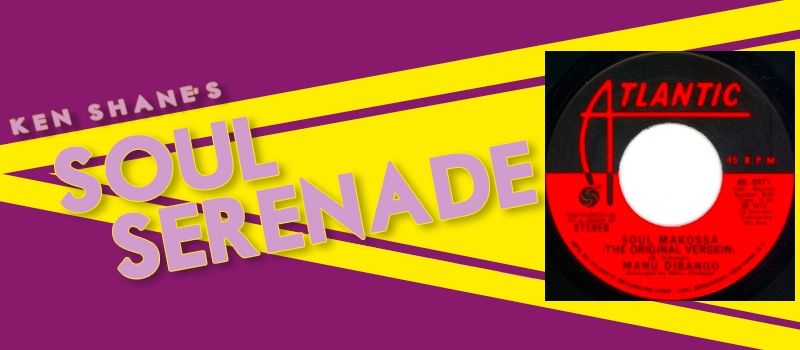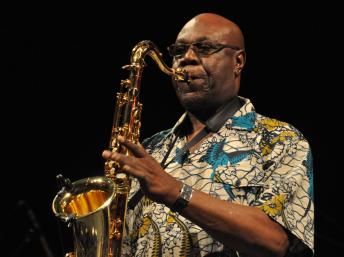 Soul and funk are not exclusive provence of the United States. In fact, when you get right down to it, while the music was codified by musicians in places like Detroit, Memphis, and Muscle Shoals, the original sounds, the rhythms that influenced and inspired those musicians, came from Africa aboard slave ships. In the most shameful era of this nation’s history, it was a musical tradition that helped to keep a people alive. So classic soul music from Africa? Yes indeed.
Soul and funk are not exclusive provence of the United States. In fact, when you get right down to it, while the music was codified by musicians in places like Detroit, Memphis, and Muscle Shoals, the original sounds, the rhythms that influenced and inspired those musicians, came from Africa aboard slave ships. In the most shameful era of this nation’s history, it was a musical tradition that helped to keep a people alive. So classic soul music from Africa? Yes indeed.
Manu Dibango was born in Cameroon. His father was a civil servant, and his mother a fashion designer. As a child Dibango attended a Protestant school for religious training. He particularly liked the music education, and learned fast. In the 1950’s Dibango began to travel the world, playing his saxophone in France, Belgium, Jamaica, Zaire, and Cote d’Ivoire, as well as his own country.
Dibango was a founding member of the pioneering Zairean band African Jazz in 1960, and he remained with the band for five years. It was in 1972 that Dibango became known worldwide with the release of “Soul Makossa.” A few copies of the single made their way to New York City and when an entrepreneur named David Mancuso found one in a West Indian record store in Brooklyn, he began to play it at his legendary “Loft” parties.
Before long, renowned DJ Frankie Crocker was spinning the record on WBLS. “Soul Makossa” was so rare that as many as 23 different groups felt free to rush out cover versions in order to take advantage of the record’s popularity.
“Soul Makossa” had originally been released on a French label called Fiesta as the B-side to a song called “Hymne De La 8e Coupe D’Afrique Des Nations,” which was a tribute to Cameroon’s national football (soccer) team. Later in 1972 Atlantic Records licensed the record from Fiesta and issued it as a single.
The Atlantic single rushed up to #35 on the Billboard Hot 100. Even with the powerful label behind the record, nine other versions of the song managed to be on the chart at the same time. When the song became an international hit, even more cover versions started coming out.
Dibango himself recorded “Soul Makossa” at least two more times. There was a new version on his 1994 album Wakafrika, and in 2011 “Soul Makossa 2.0” was the lead single from a 2011 album by Dibango and Wayne Beckford called Past Present Future. That same year, a group called Les Nubians released “Nu Soul Makossa,” which featured Dibango.
“Soul Makossa” proved to be massively influential. The iconic chant of “ma-mako, ma-ma-sa, mako-mako sa” was adapted for Michael Jackson’s smash “Wanna Be Startin’ Something” in 1982, and Rihanna’s hit “Don’t Stop the Music” in 2007.






Comments